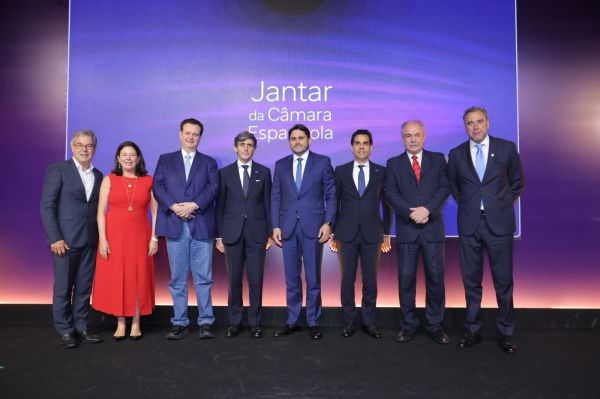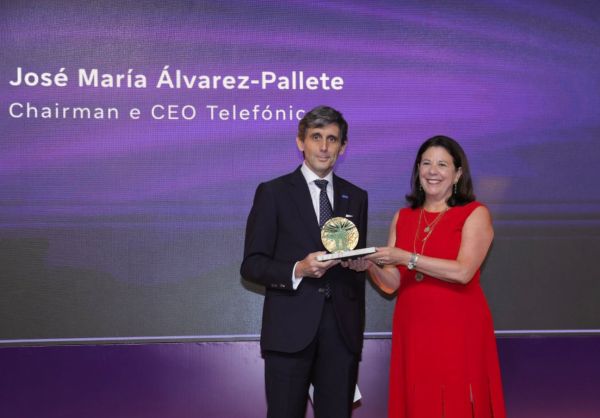His Majesty the King attended the Plenary Session of the ERT (European Round Table for Industry), which brought together more than 50 of the main executives and presidents of Europe’s largest industrial and technology companies this weekend in Madrid. José María Álvarez-Pallete, executive chairman of Telefónica, has acted as host coinciding with the year of the company’s Centenary.
The two-day meetings were also attended by Teresa Ribera, Third Vice-President of the Government of Spain, and Roberta Metsola, President of the European Parliament, along with the President of the ERT, Jean-François van Boxmeer, and Anthony Gooch Gálvez, recently appointed Secretary General of the organisation.
The meetings took place at a critical time for Europe when geopolitics is once again at the forefront. Recent reports by Enrico Letta and Mario Draghi have shown the region is lagging in terms of competitiveness, productivity, and innovation, and have outlined a clear and precise roadmap for Europe to regain its leadership.
In this complex context and coinciding with the beginning of the new institutional cycle of the European Union, the meeting focused on setting the strategic direction and priorities for the future of the ERT, via a programme of support and collaboration, to implement urgently the measures and recommendations of the Draghi and Letta Reports by the European Commission, European Parliament and the 27 Member States. The purpose of the ERT is to help adopt the necessary measures, with a focus on advancing the digital and sustainable transition, and thus recover the competitiveness of the economy in Europe, a fundamental objective to ensure the future well-being of citizens and companies.
José María Álvarez-Pallete, Executive Chairman of Telefónica, began his speech with some heartfelt words in memory of all the victims of the recent floods. The Chairman of Telefónica called for the recovery of Europe’s leadership, for which he pointed out that “it is necessary and urgent to work together to refocus our common objectives”. He insisted that “we are at a key moment, in which Europe needs a new industrial strategy that – as Mario Draghi has rightly stated – places connectivity as a cornerstone in the creation of a stronger economy and a safer, more digital, less dependent and more sustainable continent. This, without forgetting Europe´s of ensuring the progress and well-being of its citizens, for which the employability and reskilling of people is critical”.
Jean-François van Boxmeer, ERT Chair commented “This meeting has provided ERT with the opportunity to commit to restoring European competitiveness as outlined by the Draghi and Letta reports. What needs to be done is clear. The EU institutions can count on our full support to.” He added “Our companies want to build and the get implementation job done be powerful sources of growth, jobs and innovation to help Europe thrive and prosper. ERT had laid the foundations to help transform the European economy in the next four years and recover the competitiveness lost at a global level, by realising the untapped potential of our Single Market.”
In this context, the ERT considers it urgent to address one of the great challenges facing Europe: the growing employability gap. In this sense, José María Álvarez-Pallete, who chairs the ERT’s Employment, Training and Impact working group, presented the New Career Network (newcareernetwork.es), a project framed in the ERT’s Reskilling for Employment (R4E) initiative. It is an innovative platform recently launched in Spain and Portugal, with the aim of aligning, through AI, the qualification of people with the new profiles. Work is underway to roll out this tool in other EU countries.
This is not the first time that Telefónica has hosted the ERT, which already held a plenary meeting at its headquarters in Madrid in 2015. On this occasion, it is held within the framework of the celebrations for the first Centenary of the company.
ERT, in figures
The ERT was created in 1983 and works to create a strong, open, and competitive Europe, which acts as an engine of sustainable growth and prosperity for all its citizens. It brings together the top executives of the 61 most important industrial and technology companies in Europe.
The ERT is chaired by Jean-François van Boxmeer, chairman of the Vodafone group. In addition to José María Álvarez-Pallete, chairman of Telefónica, other representatives of Spanish companies include Óscar García Maceiras, CEO of Inditex; Ignacio Sánchez Galán, chairman of Iberdrola; and Rafael del Pino, Chairman of Ferrovial.
Airbus, ASML, BASF, Mercedes Benz, Deutsche Telekom, E.ON, Ericsson, GSK, Heineken, L’Oreal, Merck Group, Michelin, Nestlé, Norsk Hydro, Orange, Sonae, Siemens, Syensqo, Thyssenkrupp, Unilever o Volvo Group are other large multinationals that are part of the ERT (full list at the following link: Members – ERT).
These 61 large companies have combined revenues of 2 trillion euros, generate 5 million jobs and invest 60,000 million euros a year in Innovation and Development.
Airbus, ASML, BASF, Mercedes Benz, Deutsche Telekom, E.ON, Ericsson, GSK, Heineken, L’Oreal, Merck Group, Michelin, Nestlé, Norsk Hydro, Orange, Sonae, Siemens, Syensqo, Thyssenkrupp, Unilever o Volvo Group son otras de las grandes multinacionales que forman parte de la ERT (lista completa en el siguiente link: Members – ERT).
The members of the ERT meet twice a year and in these meetings they discuss the key issues of the moment. The work of the association is structured in seven working groups in which experts from the different companies participate. The subjects are Competitiveness and Innovation; Employment, Training and Impact; Digital Transformation; Energy Transition and Climate Change; Commerce; Competition Policy; Finance and Taxation.
For more information: Media – ERT









